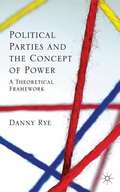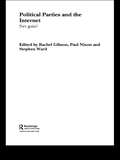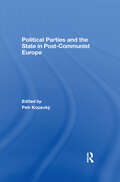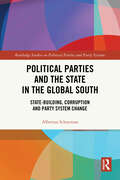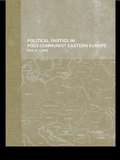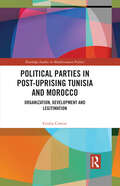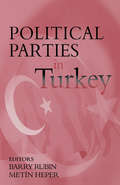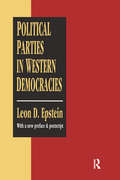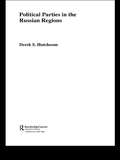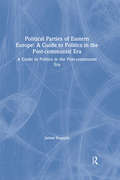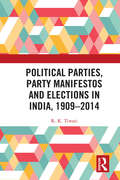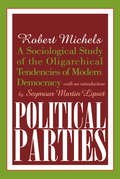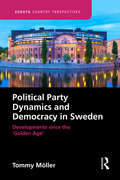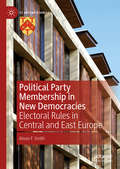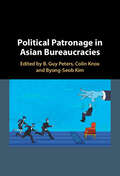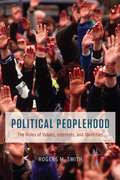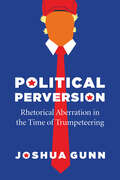- Table View
- List View
Political Parties and Terrorist Groups (Extremism and Democracy)
by Ami Pedahzur Leonard WeinbergWhat is the relationship between the political parties that embrace the democratic process and terrorist groups, which eschew the legal and procedural strictures of democracy?This acclaimed volume provides a detailed theoretical and empirical analysis of this controversial issue. Drawing on a vast array of data, the authors examine a large number of international case studies from Italy, Spain, Lebanon, Turkey, Iran, Israel, Palestine, Peru, Argentina, Japan and Northern Ireland. This comprehensive book is the definitive account of this extremely important subject.
Political Parties and the Concept of Power
by Danny RyeThis richly critical and original perspective on the way power within political parties structures and influences party life offers an original investigation into the nature of the forces that make members and representatives both loyal and beneficial to a contemporary political party. The study skilfully and imaginatively weaves together theoretical reflection through the use of interviews and archive material to provide a unique perspective on power, arguing that it is both more complex and nuanced than mainstream approaches to political parties assume. As well as providing a more satisfactory, general, framework for understanding how power functions in democratic politics, this book also delivers a fresh interpretation of the development of the modern Labour Party. This text is essential reading for students and scholars of British Party politics and may be of interest to academics exploring political parties more generally.
Political Parties and the European Union
by John GaffneyPolitical Parties and the European Union offers a panoramic survey of the political parties of contemporary Europe. It covers party politics from Scandinavia to Greece, focusing on how parties in the individual member states have responded to the processes of European integration. Despite a trend towards political convergence, national traditions continue to shape politics across Europe. In order to reflect, and do justice to, the diversity of political cultures, the book combines case studies, comparative approaches and supranational perspectives. It examines the history of the main national parties, offers new comparative perspectives on communist, green and extreme right parties, and analyses party politics at the European level.
Political Parties and the Internet: Net Gain?
by Rachel Gibson Stephen Ward Paul NixonCan the Internet help to re-engage the public in politics? How are political parties using the Internet as a communication tool? Has politics changed in the information age?This book provides an assessment of how political parties are adapting to the rise of new information and communication technologies and what the consequences will be. It includes case studies of the US, the UK, Australia, Korea, Mexico, France, Romania and the Mediterranean region.
Political Parties and the State in Post-Communist Europe
by Petr KopeckýIt is not possible to understand the nature and functioning of post-communist political parties without understanding their relationship with the state. On the one hand, few parties in the region would be able to survive and perform without state resources as they lack strong roots within the wider society. On the other hand, the relatively weak st
Political Parties and the State in the Global South: State-Building, Corruption and Party System Change (Routledge Studies on Political Parties and Party Systems)
by Albertus SchoemanThis book introduces a new framework for understanding how the relationship between political parties and the state shapes the development of political parties, party systems and democratic consolidation.Drawing on comparative case studies spanning the Indian subcontinent, Africa, and East and Southeast Asia, the book shows how the sequencing of state-building and the development of political institutions can blur distinctions between political parties and the state with long-term consequences for their respective development. This includes understanding the effects of authoritarian and colonial legacies on shaping this relationship and the nature of interparty competition with significant consequences for public sector corruption, political stability, and the formation and institutionalisation of party systems.This book will be of key interest to scholars and students of democratic development, comparative politics, party politics and institutional development in the Global South.
Political Parties in Africa
by Sebastian ElischerThis book examines the effects of ethnicity on party politics in sub-Saharan Africa. Sebastian Elischer analyzes political parties in Ghana, Kenya and Namibia in detail, and provides a preliminary analysis of parties in seven other countries including Tanzania, Botswana, Senegal, Zambia, Malawi, Burkina Faso and Benin. Elischer finds that five party types exist: the mono-ethnic, the ethnic alliance, the catch-all, the programmatic, and the personalistic party. He uses these party types to show that the African political landscape is considerably more diverse than conventionally assumed. Whereas ethnic parties dominate in some countries, non-ethnic parties have become the norm in others. This study also finds a correlation between a country's ethnic make-up and the salience of political ethnicity: countries with a core ethnic group are prone to form non-ethnic parties. In countries lacking a core ethnic group, ethnic parties constitute the norm.
Political Parties in Multi-Level Polities
by Nicholas Aylott Magnus Blomgren Torbjörn BergmanPolitical parties are essential for the functioning of parliamentary democracy but how have parties adapted to the challenges created by the growth of a new layer of political decision-making at the supranational level, i. e. the EU? This comparative survey focuses on parties in four Nordic countries, including Norway, which remains outside the EU.
Political Parties in Palestine: Leadership and Thought
by Michael BröningParty Politics in Palestine is an up-to-date elucidation of the fractious Palestinian political scene, providing for the first time a lively and comprehensive discussion of the ideological outlook, historical development, and political objectives of all of Palestine's major political actors.
Political Parties in Post-Communist Eastern Europe
by Paul LewisPolitical Parties in Post-Communist Eastern Europe is the first textbook to survey the course of party developments in eastern Europe as a whole in the post-Communist period. This book relates the specifics of the post-communist situation to the broader picture of the early stages of party development in western Europe and also to contemporary models of party organisation in established democracies.The book includes:· a brief historical introduction to the context of post-communist change· the process of competitive party formation and democratic elections· the development of independent parties; their ideologies, and electoral volatility· the structure and level of organisation developed by new parties· an analysis of stable party systems which have emerged in eastern Europe and the contribution they make to emerging democracies in the regionParty Politics in Post-Communist Eastern Europe will be a comprehensive and invaluable resource, accessible to undergraduates of politics and European studies, as well as the non-specialist reader.
Political Parties in Post-Uprising Tunisia and Morocco: Organization, Development and Legitimation (Routledge Studies in Mediterranean Politics)
by Giulia CiminiThis book offers a comparative, theory-grounded study of Maghrebi political parties since the Arab uprisings, specifically focused on Tunisia and Morocco in the first decade after the 2011 watershed elections. Based on primary sources, including in-depth interviews and updated party statutes and bylaws, the author introduces four case studies of key Islamist and anti-Islamist parties, exploring their organisational standing, internal working, and legitimating assets. By dwelling into a topic long neglected, the author provides insight into the "hybrid" nature of political parties in the Maghreb, oscillating between juxtaposed traditional and modern discourses and ambivalent sources of political authority. As such, it is hybridisation that shapes parties’ organisational choices and development and accounts for differences within parties. In the wake of political liberalisation, the author argues that political parties have become increasingly distant from society, distrusted by a large part of the citizenry. Ultimately, the Tunisian and Moroccan cases invite reflection on similar phenomena taking place within the Middle East and North Africa region, and even outside of it. Bridging disparate disciplines, including comparative politics, area studies, and contemporary Middle Eastern history, the book will be of interest to a broad range of graduate-level students and academics.
Political Parties in Turkey (Routledge Library Editions: Turkey Ser.)
by Barry Rubin Metin HeperTurkey's growing international profile, candidacy for the EU, and persistent democracy has led to a growing interest in how that country is governed. This book provides portraits of the seven main political parties by Turkish experts who are close observers of these institutions. In addition to providing an analytical survey of Turkish politics today, this volume also provides a fascinating case study on the problems of developing deep-rooted democracy, conflicts between state interests amd interest groups, and the evolution of party systems.
Political Parties in Western Democracies
by Leon D. EpsteinPresents a brilliant, persuasive case that American political parties, so often dismissed as immature or ineffective compared with their European counterparts, are in fact old and durable political organizations, serving well the needs of a pluralistic society. What chiefly distinguishes this work is the inclusion of considerable material on American parties in a comparative context to the analysis of British, Scandinavian, European, Canadian, Australian and New Zealand political parties.
Political Parties in the Russian Regions (BASEES/Routledge Series on Russian and East European Studies)
by Derek S. HutchesonSince the break-up of the Soviet Union in 1991, Russia's party system has suffered a difficult and turbulent infancy. Moscow based parties have had only very limited territorial penetration, and fragmentation has been one of its most significant features.Based on extensive fieldwork in three Russian regions, this book examines the development of the country's party system and the role played by parties in regional politics. Using a comparative approach, it scrutinises the internal structures and activities of the parties, looks at their decision-making processes, their everyday party life, the activities of party members, and the role of regional party organisations in federal and local election campaigns.
Political Parties of Eastern Europe: A Guide to Politics in the Post-communist Era
by Janusz BugajskiThis comprehensive one-volume guide to politics in Eastern Europe provides a wealth of information on the region. The author outlines the emergent political spectrum of parties and coalitions, which are described in the 20 country chapters that make up the heart of the book. Parties are classified across the political spectrum and discussed individually in terms of programs, leadership, and political activity. Tables at the end of each country chapter present basic political data and electoral results. A concluding essay evaluates democratic development in the region.
Political Parties, Party Manifestos and Elections in India, 1909–2014
by R. K. TiwariIn the parliamentary system of government, manifestos constitute and represent an important aspect of the democratic electoral politics as statements of a party’s ideology, response and policy. This book offers an examination of election manifestos of different political parties in India at the national level. It explores the manifesto as an input to the policy process and presents a comparative perspective and understanding on the issues and approaches of the national political parties on key affairs. The book traces the evolution of the electoral system, political parties and party manifestos in India as they emerged and developed over time. It looks at the Statutes of 1909, 1919 and 1935 along with the party manifestos and elections until 1945–46. The author further analyses Constituent Assembly debates on the electoral system and the stances of political parties on national reconstruction through documents from parties, including the Indian National Congress, the Communist Party of India, the Socialist Party, Jana Sangh and the All India Scheduled Castes Federation. Covering manifestos of sixteen Lok Sabha Elections (from the first general election of 1952 to 2014), this book provides a comprehensive overview of how major political parties think on significant social, economic, political, foreign and defence-related issues. It will be useful to scholars and researchers of political science, election studies, modern Indian history, public administration, law and governance, sociology, media and journalism as also to legislators and policymakers.
Political Parties: A Kid's Guide (Kids' Guide to Elections)
by Cari MeisterRight or left. Blue or red. Donkeys or elephants. What are political parties all about? Readers learn all about the different politcal parties in America an how they play a part in our elections.
Political Parties: A Sociological Study of the Oligarchical Tendencies of Modern Democracy
by Robert MichelsThe principle of self-government through political parties, the cornerstone of democracy, has come to be regarded as a solution to the problem of nationality. This is because the principle of nationality entails the acceptance of the idea of popular government. The importance of the principle of nationality is undeniable, and most of the national questions of Western Europe might be solved in accordance with this principle. Matters are complicated by geographical and strategical considerations, such as the difficulty of determining natural frontiers and the frequent need to establish strategic frontiers. Moreover, the principle of nationality cannot help us where nationalities barely exist or where they are entangled in inextricable confusion.The present work is a critical discussion of the problem of democracy. Michels believes that democracy, as an intellectual theory and as a practical movement, has entered upon a critical phase from which exit will be extremely difficult. In this book he analyzes the tendencies that oppose the realization of democracy, and claims that these tendencies can be classified in three ways: dependence upon the nature of the individual; dependence upon the nature of the political structure; and dependence upon the nature of organization.This edition, described by Morris Janowitz as a "classic of modern social science" and by Melvin Tumin as "the beginning of a tradition," offers a landmark study in political science. Following its original publication in 1910, the study and analysis of political parties was established as a new branch of science. Political Parties continues to be a foundation work in the literature and is a necessary addition to the libraries of contemporary political scientists, sociologists, and historians.
Political Party Dynamics and Democracy in Sweden: Developments since the ‘Golden Age’ (Europa Country Perspectives)
by Tommy MollerSweden has often been described as a democratic forerunner, with one of the world's most stable party systems and with a well-functioning parliamentary system. However, the political landscape in Sweden has undergone a rapid change in recent years. The institutions of the political system – not least political parties – appear from a historical perspective to have become partly dysfunctional. The previously stable party system has become unstable. Consequently, it has become more difficult to form governments, and more difficult for governments to govern. The famous culture of consensus has been replaced by a harsher and more confrontational political climate; the tone in political debate has become more aggressive. During the so-called `golden age' of the party system, which lasted for a few decades from the middle of the twentieth century, parties could successfully mobilize broad and well-defined social interests with strong collective identities. Now, other conditions apply that have dramatically changed the role of parties in the democratic process. Parties have gone from being member-based popular movements to becoming professionalized voter-orientated campaign machines. Short-sightedness and a focus on median voters mean that the established parties have become increasingly similar, and populist parties have had great success in recent decades as a consequence. This volume, aimed at political scientists and those interested in discussion and analysis of Swedish political party dynamics, focuses on political parties in Sweden, how they have changed and what the changes mean in a wider sense.
Political Party Funding and Private Donations in Italy (Interest Groups, Advocacy and Democracy Series)
by Chiara FiorelliDespite any evidence against it, political parties still represent the most important collective actor in a democratic political system. Their role in representing pluralism and their electoral centrality is not undermined, even when it is strongly questioned. As long as political parties can be understood as representative actors articulating political demands, this book focuses on the capacity of Italian political parties to mobilize resources and financial resources in particular. Through the analysis of private financial donations to political parties, a neglected source of information that will be fundamental in the near future, the author assesses their connective capability with specific interests’ representatives in the last decades in order to provide evidence of their changing representational role as collective actors.
Political Party Membership in New Democracies: Electoral Rules in Central and East Europe (St Antony's Series)
by Alison F. SmithThis book explores the impact of electoral rules on political party development in Central and East Europe. It finds that ‘high district magnitude’ proportional electoral systems encourage centralised organisational development and campaigning – where communication with voters is conducted primarily via mass, social and digital media – while small electoral districts stimulate grassroots campaigning. As a result, low magnitude electoral systems are more likely to create an active role for party members, stimulating membership recruitment. The book further examines how parties organise and campaign on the ground. The analysis of in-depth surveys and interviews with party elites in Estonia, Lithuania and Slovakia sheds light on areas of party life that are rarely examined, including party fundraising. Overall, the effects of electoral systems on party organisation and campaigning reflect patterns previously observed in Western Europe, demonstrating that a degree of convergence has occurred.
Political Party Research: An Overview
by Elmar WiesendahlThe book by the well-known German party researcher Elmar Wiesendahl presents the development, theoretical perspectives, research approaches, and fields of investigation in party research in light of the state of the art.
Political Peoplehood: The Roles of Values, Interests, and Identities
by Rogers M. SmithFor more than three decades, Rogers M. Smith has been one of the leading scholars of the role of ideas in American politics, policies, and history. Over time, he has developed the concept of "political peoples," a category that is much broader and more fluid than legal citizenship, enabling Smith to offer rich new analyses of political communities, governing institutions, public policies, and moral debates. This book gathers Smith's most important writings on peoplehood to build a coherent theoretical and historical account of what peoplehood has meant in American political life, informed by frequent comparisons to other political societies. From the revolutionary-era adoption of individual rights rhetoric to today's battles over the place of immigrants in a rapidly diversifying American society, Smith shows how modern America's growing embrace of overlapping identities is in tension with the providentialism and exceptionalism that continue to make up so much of what many believe it means to be an American. A major work that brings a lifetime of thought to bear on questions that are as urgent now as they have ever been, Political Peoplehood will be essential reading for social scientists, political philosophers, policy analysts, and historians alike.
Political Perversion: Rhetorical Aberration in the Time of Trumpeteering
by Joshua GunnWhen Trump became president, much of the country was repelled by what they saw as the vulgar spectacle of his ascent, a perversion of the highest office in the land. In his bold, innovative book, Political Perversion, rhetorician Joshua Gunn argues that this “mean-spirited turn” in American politics (of which Trump is the paragon) is best understood as a structural perversion in our common culture, on a continuum with infantile and “gotcha” forms of entertainment meant to engender provocation and sadistic enjoyment. Drawing on insights from critical theory, media ecology, and psychoanalysis, Gunn argues that perverse rhetorics dominate not only the political sphere but also our daily interactions with others, in person and online. From sexting to campaign rhetoric, Gunn advances a new way to interpret our contemporary political context that explains why so many of us have difficulty deciphering the appeal of aberrant public figures. In this book, Trump is only the tip of a sinister, rapidly growing iceberg, one to which we ourselves unwittingly contribute on a daily basis.

